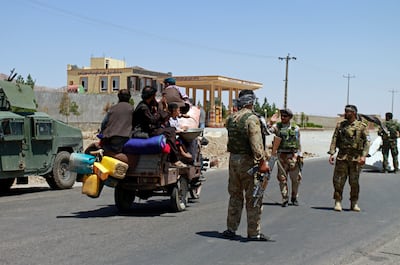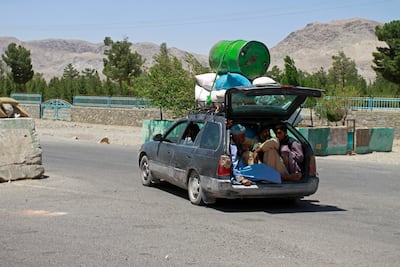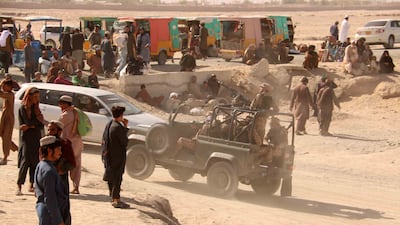The Taliban seized a fifth provincial capital in northern Afghanistan on Monday following a weekend blitz that saw urban centres fall in quick succession and the government struggle to keep the militants at bay.
Insurgents entered Aibak without a fight after community elders pleaded with officials to spare the city from more violence following weeks of clashes on the outskirts, said Sefatullah Samangani, deputy governor of Samangan province.
“The governor accepted and withdrew all the forces from the city,” Mr Samangani said, and the Taliban were now in “full control".
A Taliban spokesman confirmed the city had been taken.
The insurgents have so far overrun the main cities in six out of Afghanistan's 34 provinces, beginning with Zaranj, capital of Nimruz province in the south-west, on Friday.
Earlier Monday, the Taliban said they were moving in on Mazar-i-Sharif – the largest city in the north and a linchpin for the government's control of the region – after capturing Sheberghan to its west, and Kunduz and Taloqan to its east.
A spokesman said Taliban fighters had entered the city, but officials and residents said the group was exaggerating, with clashes confined to surrounding districts.
“The enemy is trying to distort public opinion and create anxiety for the civilian population by their propaganda,” said a statement from the provincial police force in Balkh, where Mazar-i-Sharif is the capital.
Mazar's longtime strongman Atta Mohammad Noor vowed to fight to the end, saying there would be “resistance until the last drop of my blood".
“I prefer dying in dignity than dying in despair,” he tweeted.
The loss of the city, steeped in history and long an economic hub, would signal the collapse of Kabul's control of the north and likely raise major questions about the future of the government.
In neighbouring Kunduz, the second-largest city in the north that fell to the Taliban Sunday, residents said insurgents were all over the city, occupying government offices and institutions.
“The security situation is not good and we fled to save our lives,” Rahmatullah, a 28-year-old resident, told AFP.
“It is like a horror movie,” he said.
Another resident, Abdul Qudoos, said fears were growing that Kunduz would face food and water shortages.

The insurgents' offensive continues despite condemnations by the international community and warnings from the UN that a military victory and takeover by the Taliban will not be recognised.
The group has also not heeded calls to return to long-stalled peace talks with the Afghan government.
Fighting in Afghanistan's long-running conflict has escalated dramatically since May, when the US-led military coalition began the final stage of a withdrawal set to be completed before the end of the month. The withdrawal of foreign forces is due to finish at the end of this month ahead of the 20th anniversary of the September 11 attacks. The US-led invasion sparked by 9/11 toppled the first Taliban regime in 2001.

As the Taliban pressed ahead in the north, fighting also raged in the south, where Afghan forces have been locked in heavy street-to-street fighting with the Taliban.
The insurgents have for weeks been trying to take Kandahar and Lashkar Gah – both with Pashtun majorities from where the Taliban draw their strength.
“We're clearing houses, roads, and buildings that the Taliban occupy,” Gen Sami Sadat, commander of the Afghan army's 215 Corps, told AFP from Lashkar Gah.
The ministry of defence said hundreds of Taliban fighters had been killed or injured in the last 24 hours.
Both sides routinely exaggerate death tolls that are virtually impossible to verify.
The claims come a day after Kunduz, Sar-e-Pul and Taloqan in the north fell within hours of each other.
Northern Afghanistan has long been considered an anti-Taliban stronghold that saw some of the stiffest resistance to militant rule in the 1990s.
The region remains home to several militias and is also a fertile recruiting ground for the country's armed forces.
The militants have been pushing across much of Afghanistan in recent weeks and senior government officials in Kabul have also been the targets of attacks.
Also on Monday, an Afghan radio station manager was killed in Kabul and a journalist was kidnapped in Helmand province, local government officials said.
It is the latest in a series of attacks against media personnel.
Toofan Omar, station manager of Paktia Ghag radio and an officer for NAI, a rights group supporting independent media in Afghanistan, was shot and killed in the capital on Sunday.
“Omari was killed by unidentified gunmen. He was liberal man. We are being targeted for working independently,” said Mujeeb Khelwatgar, head of the rights group.
Officials in Kabul suspect Taliban fighters carried out the attack.
Last month, the NAI reported that at least 30 journalists and media workers have been killed, wounded or abducted by militant groups in Afghanistan this year.
In Helmand province, officials said Taliban fighters kidnapped a journalist, Nematullah Hemat, from his home in Lashkar Gah on Sunday.
“There is just absolutely no clue where the Taliban have taken Hemat. We are really in a state of panic,” said Razwan Miakhel, head of private TV channel Gharghasht TV, Hemat's employers.
A Taliban spokesman told Reuters that he had no information about the killing in Kabul or the abduction in Helmand.
A coalition of Afghan news organisations have written to US President Joe Biden and leaders in the House of Representatives to urge them to grant special immigration visas to Afghan journalists and support staff.
Taliban fighters entered the capital of the northern Jowzjan province after taking control of nine of 10 districts in the province. The city of Kandahar, the provincial capital of a southern province with the same name, also remains under siege.
The insurgents issued an English-language statement on Sunday, saying residents, government employees and security officials had nothing to fear from them.
But revenge attacks and the repressive treatment of women have been reported in areas now under Taliban control.

